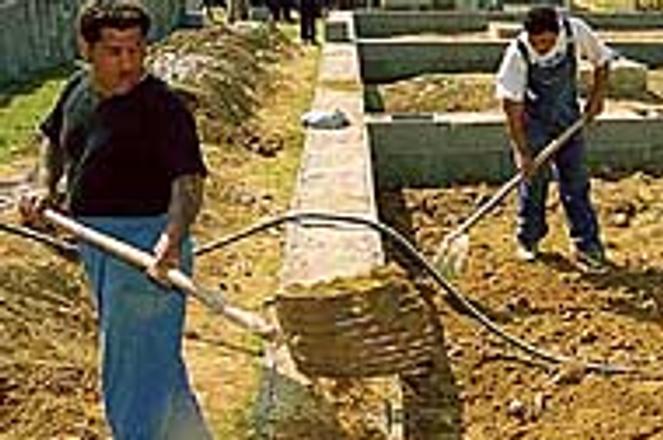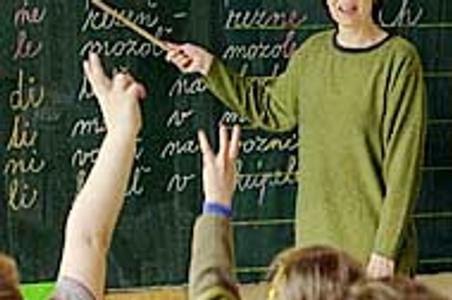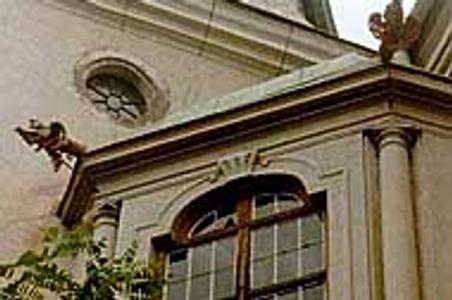Archive of articles - May 2002, page 10
If you desire to read an old article, use the search bar or select the publication date.
EU praises Roma housing plan
PRIME Minister Mikuláš Dzurinda took senior EU diplomat Günter Verheugen on a guided tour of a tiny village in eastern Slovakia on May 3 to show the European Commissioner for Enlargement what he called "proof that things can be done" to improve housing for Slovak Roma.Around 1,100 Roma from the Žehra village's total 1,500 inhabitants turned out to welcome the visitors, some armed with spades and wheelbarrows as they worked to finish 41 state-financed flats by the fall.The housing project, funded mainly by the Slovak government, was presented as proof the country was working to improve the housing situation for Slovakia's estimated 400,000 Roma, the majority of whom live in ghettos in the east of the country.
Severe drugs shortage a matter of time and money
A REVOLVING cycle of debt in Slovakia's chronically cash-poor health system may prevent delivery of life-saving medication by this summer, say Slovak drug distributors.Health insurance companies now owe nearly Sk10 billion ($220 million) for drugs and other health care products to Slovak pharmacies, leaving pharmacies unable to pay their debts to drug distributors, who in turn have trouble paying their suppliers."Distributors will soon not have the money to buy drugs from producers, who will naturally cease to provide their goods. The reduction of our supplies is neither planned, nor anticipated for a certain date. The situation will simply evolve with time," said Andrej Reiner, president of Slovakia's Association of Drug and Healthcare Equipment Suppliers (ADL).
School power transfer stumbles on funding questions
DEBT, broken wage promises and administrative chaos threaten to snarl a plan to hand state jurisdiction over Slovak secondary and elementary schools to regional and municipal parliaments, educators say.The country's schools, which until now have been administered by the state, will be transferred to lower governments on June 1 in line with a drive to decentralise power in Slovakia.However, unless the government diverts privatisation revenues to cover almost Sk1 billion in accumulated school operating debt, and unless more public money is found to pay for a promised 30 per cent pay rise for teachers, the regions will inherit a school system critically short of cash and morale.
Eyes open: A whiter shade of Mečiar
IN THE blizzard of comments foreign diplomats have made about who they do and don't want to see in government after fall elections in Slovakia, the name Vladimír Mečiar has come to stand in the press for everything in Slovak politics that the West disapproves of.In reality the West has misgivings about a number of other Slovak political leaders who still employ some of Mečiar's methods: populism, authoritarianism and subterfuge.While Mečiar's record in politics is indeed tarnished, the West has been careful to say all along that it is the style of politics practiced by the 1994-1998 Mečiar government that is objectionable, not just the man himself.
Košice receives praise, loan deal for bold budget cuts
CASH-strapped Košice looked to be past the worst of its financial problems as town, government and bank officials signed a contract on May 6 to restructure the massive debt of Slovakia's second largest city.The agreement gives the state and Prvá komunalná banka (PKB) supervision over the restructuring of Košice's Sk1.7 billion debt, and comes shortly after the town received a rating of C-plus with a positive outlook from the Slovak Rating Agency."With regards to the restructuring of mortgages and debt servicing, in which the government and PKB are also involved, the signing of the contract is a very positive step," said Košice deputy mayor Boris Farkašovský.
Castle, anyone?
SLOVAK castles and historical monuments are being auctioned off in a concerted campaign by local owners to save them from dilapidation.In the vanguard of the auction is a catalogue run by the Slovak Conservation Institute (SPÚ), which can be found online at www.pamiatky.sk. Now almost a decade old, the catalogue lists 60 castles, chateaux and monasteries put up for sale by their owners. Many of the sellers are municipalities or individuals who acquired the properties under a law returning them from communist appropriation, but who lack the finances to repair them after decades of state neglect.
- The law changed. Our family papers were ready. Now my kids are Slovak citizens
- Maria Theresa on the banks of Bratislava
- Slovakia loses another EV model to Spain as Stellantis chooses Zaragoza over Trnava
- From eight to thousands of runners. How Košice marathon rose to prominence Photo
- The Kremlin’s security agency has a Russian contractor in Slovakia - no one has noticed
- Slovak female triathlete shatters barriers with historic win at Himalayan event
- Iconic Slovak barn still draws crowds. Without donors, it might have been lost Photo
- No more photos or bank statements? Slovakia moves to ease residence process
- The law changed. Our family papers were ready. Now my kids are Slovak citizens
- Maria Theresa on the banks of Bratislava
- The Kremlin’s security agency has a Russian contractor in Slovakia - no one has noticed
- Slovak female triathlete shatters barriers with historic win at Himalayan event
- Slovakia loses another EV model to Spain as Stellantis chooses Zaragoza over Trnava
- From eight to thousands of runners. How Košice marathon rose to prominence Photo
- No more photos or bank statements? Slovakia moves to ease residence process
- Iconic Slovak barn still draws crowds. Without donors, it might have been lost Photo
- The law changed. Our family papers were ready. Now my kids are Slovak citizens
- Maria Theresa on the banks of Bratislava
- No more photos or bank statements? Slovakia moves to ease residence process
- Weekend: Celebration of fun comes to Malacky Photo
- Top 10 events in Bratislava for foreigners
- 3 free things to do in Bratislava in the next seven days
- The Kremlin’s security agency has a Russian contractor in Slovakia - no one has noticed
- Digital Jarvis is real now. He is coming for your to-do list
- The law changed. Our family papers were ready. Now my kids are Slovak citizens
- Maria Theresa on the banks of Bratislava
- No more photos or bank statements? Slovakia moves to ease residence process
- A mayor resigns over €2.7 million fraud scandal at town hall
- The Kremlin’s security agency has a Russian contractor in Slovakia - no one has noticed
- Fico praises China and Vietnam as models, says liberal democracy has failed
- News digest: Violent gang in Bratislava is under arrest
- He designed Gatwick. But this is his masterpiece
- The law changed. Our family papers were ready. Now my kids are Slovak citizens
- News digest: Prosecutor seeks jail for NBS Governor Kažimír as his political support wanes
- Slovakia loses another EV model to Spain as Stellantis chooses Zaragoza over Trnava
- Slovak female triathlete shatters barriers with historic win at Himalayan event
- Weekend: Celebration of fun comes to Malacky Photo
- News digest: Fico’s bloc wants to save money by restricting electoral access
- Slovakia plans to restrict access to new medicines amid funding shortfall
- No more photos or bank statements? Slovakia moves to ease residence process More articles ›





